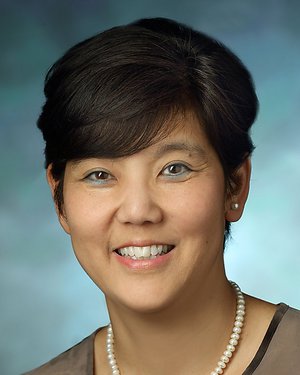
Yuka C. Manabe, MD
Infectious Diseases
Highlights
Johns Hopkins Affiliations:
- Johns Hopkins School of Medicine Faculty
About Yuka C. Manabe
Professional Titles
- Associate Director of Global Health Research and Innovation
- Medical Director, John G. Bartlett Specialty Practice
Primary Academic Title
Professor of Medicine
Background
Dr. Yukari Manabe is a Professor in the Division of Infectious Diseases in the Department of Medicine with secondary appointments in the Bloomberg School of Public Health Department of International Health and the Department of Microbiology and Molecular Immunology. Dr. Manabe obtained her undergraduate degree from Yale University and her M.D. from Columbia University College of Physicians and Surgeons. After completing both her residency in Internal Medicine and fellowship in Infectious Diseases at Johns Hopkins Hospital, she joined the faculty in 1999.
Dr. Manabe began her career working on the basic science aspects of tuberculosis (TB) immunopathogenesis in comparative animal models of infection, particularly latency, reactivation, and immune reconstitution inflammatory syndrome (IRIS) in the rabbit model within the Johns Hopkins Center for Tuberculosis Research. In 2007, she was seconded to the Infectious Diseases Institute (IDI) at Makerere College of Health Sciences as the Associate Medical Laboratory Director of the College of American Pathologists certified Makerere University-Johns Hopkins University Clinical Core Lab to study antiretroviral associated TB and IRIS. She then became the Head of Research at the IDI in 2008 until 2012 where she built research capacity and infrastructure for training Ugandan investigators.
Dr. Manabe has been doing operational and translational research in tuberculosis and HIV co-infection as well as evaluating TB and other infectious disease diagnostics. She is particularly interested in rapid, point-of-care infectious disease diagnostics suitable for the resource-limited settings particularly in sub-Saharan Africa (SSA). Her research has focused on accuracy testing of various rapid, point-of-care diagnostics for HIV and related infectious diseases of clinical importance in SSA. She is also interested in studying the impact of various diagnostic interventions on disease detection and patient outcomes.
Centers and Institutes
Lab Website
Yukari Manabe Lab
- Investigators in the Yukari Manabe Lab evaluate the accuracy of rapid, point-of-care diagnostics for HIV, tuberculosis and related infectious diseases in resource-limited settings particularly sub-Saharan Africa and examine the impact of diagnostic interventions on disease detection and patient outcomes. The team also conducts operational and translational research in tuberculosis and HIV co-infection.
Research Summary
As part of the Center for Global Health, Dr. Manabe is interested in rapid diagnostics suitable for the resource-limited settings particularly in sub-Saharan Africa (SSA). She began her career working on the basic science aspects of tuberculosis (TB) immunopathogenesis in comparative animal models of infection, particularly latency, reactivation, and immune reconstitution inflammatory syndrome (IRIS) in the rabbit model within the Johns Hopkins Center for Tuberculosis Research. In 2007, she was seconded to the Infectious Diseases Institute (IDI) at Makerere College of Health Sciences as the Associate Medical Laboratory Director of the College of American Pathologists certified Makerere University-Johns Hopkins University Clinical Core Lab to study antiretroviral associated TB and IRIS. She then became the Head of Research at the IDI in 2008 until 2012 where she built research capacity and infrastructure for training Ugandan investigators. Her research has focused on accuracy testing of various rapid, point-of-care diagnostics for HIV and related infectious diseases of clinical importance in SSA. She is also interested in studying the impact of various diagnostic interventions on disease detection and patient outcomes.
Memberships
- Infectious Diseases Society of America
- American Society for Microbiology
- American Society for Tropical Medicine and Hygiene
Locations
- The Johns Hopkins Hospital
- 1800 Orleans Street, Baltimore, MD 21287
- phone: 410-955-5000
- fax: 410-955-5001
Expertise
Education
Johns Hopkins University School of Medicine
Fellowship, Infectious Diseases, 1999Johns Hopkins University School of Medicine
Residency, Internal Medicine, 1994Columbia University College of Physicians and Surgeons
Medical Education, MD, 1991Insurance
- Aetna
- CareFirst
- Cigna
- First Health
- Geisinger Health Plan
- HealthSmart/Accel
- Humana
- Johns Hopkins Health Plans
- MultiPlan
- Pennsylvania's Preferred Health Networks (PPHN)
- Point Comfort Underwriters
- Private Healthcare Systems (PHCS)
- UnitedHealthcare
- Veteran Affairs Community Care Network (Optum-VACCN)
